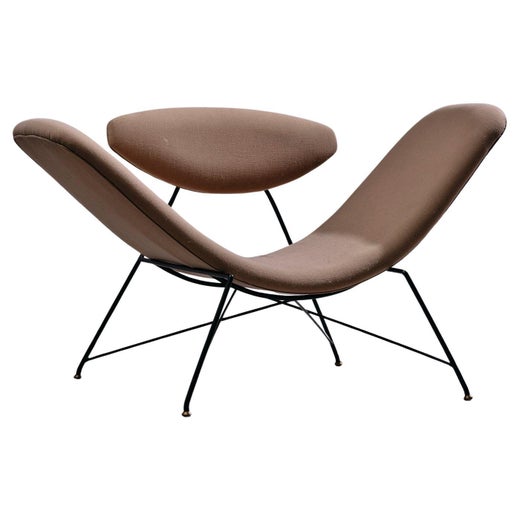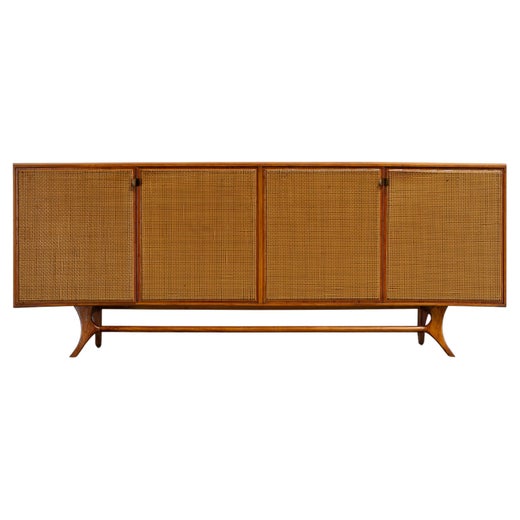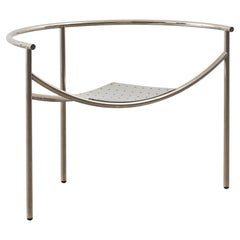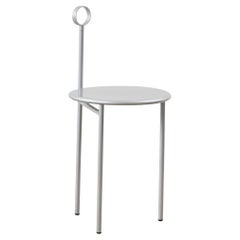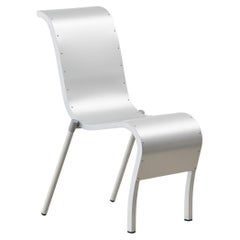Reversible Chair by Carlo Hauner & Martin Eisler for Forma Moveis, Brazil, 1955
About the Item
- Creator:Forma Brazil (Manufacturer),Carlo Hauner and Martin Eisler (Designer)
- Dimensions:Height: 25.99 in (66 cm)Width: 40.16 in (102 cm)Depth: 27.96 in (71 cm)
- Style:Mid-Century Modern (Of the Period)
- Materials and Techniques:
- Place of Origin:
- Period:
- Date of Manufacture:1955
- Condition:Wear consistent with age and use.
- Seller Location:London, GB
- Reference Number:Seller: E1081stDibs: LU1420212778412
Carlo Hauner and Martin Eisler
Forma began in São Paulo, under the leadership of Italian designer Carlo Hauner and Austrian architect and interior designer Martin Eisler. Hauner studied drawing and technical drawing at the Brera Academy in Milan. After participating in the Venice Biennale, he emigrated to São Paulo, where he established the furniture manufacturer Móveis Artesanal, for which Carlo and Martin — as well as Carlo’s brother Ernesto Hauner — would create a range of pieces for the home.
In 1936, Eisler earned a degree in architecture from the Academy of Fine Arts in Vienna, where he studied under Oskar Strnad and Clemens Holzmeister. With World War II looming, he left Austria immediately after graduating. He first went to Czechoslovakia, to which some of his family had already fled. In 1938, he moved to Buenos Aires, Argentina, and opened his interior design firm Interieur Forma.
Eisler relocated to Brazil in the early 1950s, where he met Hauner. At the time, Eisler had been looking for help producing furniture for his brother-in-law, Ernesto Wolf, and contacted Hauner. The two found that they had a shared vision, and with financial help from Wolf, they opened Galeria Artesanal as a storefront for Móveis Artesanal.
Looking to expand into international sales, the duo rebranded the company Forma. Sérgio Rodrigues, who helped launch a branch of Artesanal in Curitiba, was put in charge of interiors at Forma. That company soon became one of the biggest names in Brazilian furniture — it sold its own sculptural rattan lounge chairs, bookcases and other case pieces crafted with rosewood or jacaranda, and Forma was eventually distributing furniture licensed from iconic American manufacturer Knoll, thereby bringing works by noted designers such as Ludwig Mies van der Rohe, Charles Eames and Harry Bertoia to the Brazilian market.
Forma stands at the forefront of a revival of Brazilian modern furniture. Fashioned from high-grade regionally sourced hardwoods, leather and iron, even Forma's earliest creations have stood the test of time. The company’s alluring mid-century modern works appealed to homeowners at its peak, from the 1950s through the ’70s, and given the broadening interest in Brazilian furniture and the likes of designers such as Rodrigues, vintage Forma is making a major comeback today.
The Forma furniture company continued producing masterfully crafted furniture into the 1970s, until Eisler's death in 1977. Forma folded soon after, but Eisler's company in Argentina, Interieur Forma, is still in business today.
On 1stDibs, find vintage Carlo Hauner and Martin Eisler furniture for sale.
Forma Brazil
Forma stands at the forefront of a revival of Brazilian modern furniture. Fashioned from high-grade regionally sourced hardwoods, leather and iron, even Forma's earliest creations have stood the test of time. The company’s alluring mid-century modern works appealed to homeowners at its peak, from the 1950s through the ’70s, and given the broadening interest in Brazilian furniture and the likes of designers such as Sérgio Rodrigues, vintage Forma is making a major comeback today.
Forma began in São Paulo, under the leadership of Italian designer Carlo Hauner and Austrian architect and interior designer Martin Eisler. Hauner studied drawing and technical drawing at the Brera Academy in Milan. After participating in the Venice Biennale, he emigrated to São Paulo, where he established the furniture manufacturer Móveis Artesanal, for which Carlo and Martin — as well as Carlo’s brother Ernesto Hauner — would create a range of pieces for the home.
In 1936, Eisler earned a degree in architecture from the Academy of Fine Arts in Vienna, where he studied under Oskar Strnad and Clemens Holzmeister. With World War II looming, he left Austria immediately after graduating. He first went to Czechoslovakia, to which some of his family had already fled. In 1938, he moved to Buenos Aires, Argentina, and opened his interior design firm Interieur Forma.
Eisler relocated to Brazil in the early 1950s, where he met Hauner. At the time, Eisler had been looking for help producing furniture for his brother-in-law, Ernesto Wolf, and contacted Hauner. The two found that they had a shared vision, and with financial help from Wolf, they opened Galeria Artesanal as a storefront for Móveis Artesanal.
Looking to expand into international sales, the duo rebranded the company Forma. Sérgio Rodrigues, who helped launch a branch of Artesanal in Curitiba, was put in charge of interiors at Forma. That company soon became one of the biggest names in Brazilian furniture — it sold its own sculptural rattan lounge chairs, bookcases and other case pieces crafted with rosewood or jacaranda, and Forma was eventually distributing furniture licensed from iconic American manufacturer Knoll, thereby bringing works by noted designers such as Ludwig Mies van der Rohe, Charles Eames and Harry Bertoia to the Brazilian market.
The Forma furniture company continued producing masterfully crafted furniture into the 1970s, until Eisler's death in 1977. Forma folded soon after, but Eisler's company in Argentina, Interieur Forma, is still in business today.
On 1stDibs, explore Forma seating, tables and storage pieces.
You May Also Like
Mid-20th Century Brazilian Mid-Century Modern Armchairs
Iron
Mid-20th Century Brazilian Mid-Century Modern Armchairs
Wood
Vintage 1950s Brazilian Mid-Century Modern Armchairs
Iron
Vintage 1950s Brazilian Mid-Century Modern Chairs
Iron
Vintage 1950s Brazilian Mid-Century Modern Armchairs
Iron
Vintage 1950s Brazilian Mid-Century Modern Dining Room Chairs
Leather, Hardwood
Mid-20th Century Brazilian Mid-Century Modern Armchairs
Metal
Vintage 1950s Brazilian Mid-Century Modern Lounge Chairs
Steel
Early 20th Century Brazilian Mid-Century Modern Chairs
Silk, Cane, Wood
Vintage 1950s Brazilian Mid-Century Modern Armchairs
Iron
More From This Seller
View AllVintage 1980s French Mid-Century Modern Chairs
Steel
Vintage 1950s Italian Modern Dining Room Chairs
Plywood
Vintage 1980s Italian Post-Modern Chairs
Lacquer
Vintage 1980s Italian Post-Modern Chairs
Aluminum
Vintage 1980s Italian Post-Modern Chairs
Aluminum
Vintage 1980s Italian Post-Modern Armchairs
Wood
